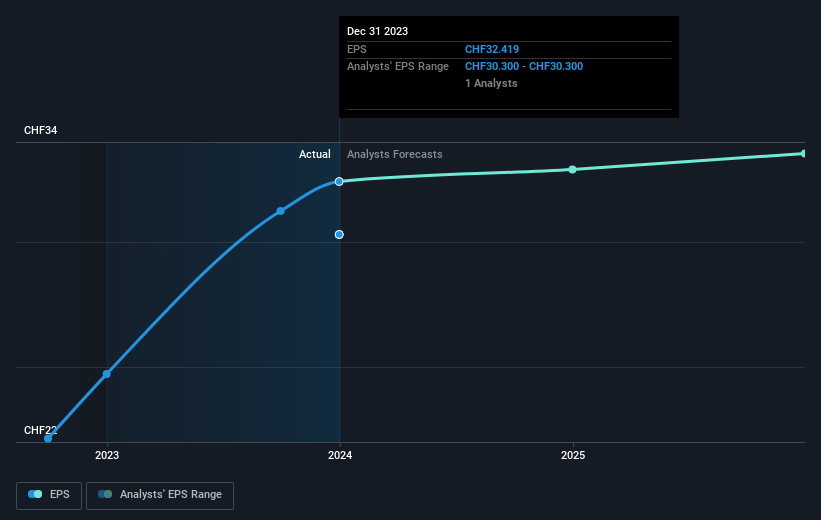Stock Analysis
- Switzerland
- /
- Banks
- /
- SWX:BCGE
Banque Cantonale de Genève's (VTX:BCGE) earnings growth rate lags the 27% CAGR delivered to shareholders

One simple way to benefit from the stock market is to buy an index fund. But if you buy good businesses at attractive prices, your portfolio returns could exceed the average market return. Just take a look at Banque Cantonale de Genève SA (VTX:BCGE), which is up 89%, over three years, soundly beating the market decline of 4.1% (not including dividends). However, more recent returns haven't been as impressive as that, with the stock returning just 56% in the last year , including dividends .
While this past week has detracted from the company's three-year return, let's look at the recent trends of the underlying business and see if the gains have been in alignment.
View our latest analysis for Banque Cantonale de Genève
While markets are a powerful pricing mechanism, share prices reflect investor sentiment, not just underlying business performance. One way to examine how market sentiment has changed over time is to look at the interaction between a company's share price and its earnings per share (EPS).
During three years of share price growth, Banque Cantonale de Genève achieved compound earnings per share growth of 31% per year. This EPS growth is higher than the 24% average annual increase in the share price. Therefore, it seems the market has moderated its expectations for growth, somewhat. This cautious sentiment is reflected in its (fairly low) P/E ratio of 9.35.
The graphic below depicts how EPS has changed over time (unveil the exact values by clicking on the image).

We know that Banque Cantonale de Genève has improved its bottom line over the last three years, but what does the future have in store? This free interactive report on Banque Cantonale de Genève's balance sheet strength is a great place to start, if you want to investigate the stock further.
What About Dividends?
When looking at investment returns, it is important to consider the difference between total shareholder return (TSR) and share price return. The TSR incorporates the value of any spin-offs or discounted capital raisings, along with any dividends, based on the assumption that the dividends are reinvested. So for companies that pay a generous dividend, the TSR is often a lot higher than the share price return. As it happens, Banque Cantonale de Genève's TSR for the last 3 years was 105%, which exceeds the share price return mentioned earlier. This is largely a result of its dividend payments!
A Different Perspective
We're pleased to report that Banque Cantonale de Genève shareholders have received a total shareholder return of 56% over one year. And that does include the dividend. That's better than the annualised return of 11% over half a decade, implying that the company is doing better recently. Someone with an optimistic perspective could view the recent improvement in TSR as indicating that the business itself is getting better with time. Before forming an opinion on Banque Cantonale de Genève you might want to consider these 3 valuation metrics.
For those who like to find winning investments this free list of growing companies with recent insider purchasing, could be just the ticket.
Please note, the market returns quoted in this article reflect the market weighted average returns of stocks that currently trade on Swiss exchanges.
Valuation is complex, but we're helping make it simple.
Find out whether Banque Cantonale de Genève is potentially over or undervalued by checking out our comprehensive analysis, which includes fair value estimates, risks and warnings, dividends, insider transactions and financial health.
View the Free AnalysisHave feedback on this article? Concerned about the content? Get in touch with us directly. Alternatively, email editorial-team (at) simplywallst.com.
This article by Simply Wall St is general in nature. We provide commentary based on historical data and analyst forecasts only using an unbiased methodology and our articles are not intended to be financial advice. It does not constitute a recommendation to buy or sell any stock, and does not take account of your objectives, or your financial situation. We aim to bring you long-term focused analysis driven by fundamental data. Note that our analysis may not factor in the latest price-sensitive company announcements or qualitative material. Simply Wall St has no position in any stocks mentioned.

Simply Wall St
About SWX:BCGE
Banque Cantonale de Genève
Banque Cantonale de Genève SA, together with its subsidiaries, provides a range of banking services to private, corporate, and institutional clients.
Solid track record with excellent balance sheet and pays a dividend.
